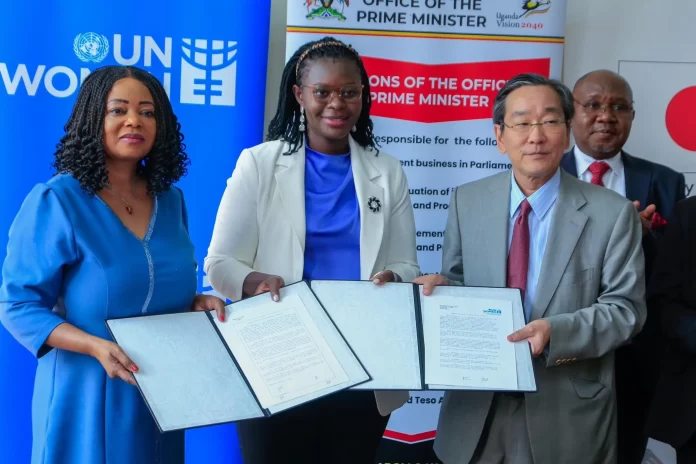The government of Japan and UN Women have announced the launch of a two-and-a-half-year project to strengthen Women, Peace, and Security (WPS) in refugee settlements and host communities in Uganda.
According to Lillian Aber, the State Minister of Relief, Disaster Preparedness, and Refugees, UN Women will implement the USD 3.6 million (approximately Ugx 13.4 billion) project through humanitarian responses.
The announcement was made during a signing ceremony between the Japanese government and UN Women held at the Office of the Prime Minister in Kampala in the presence of the minister.
“Women are increasingly at risk in conflict and underrepresented in peace processes. These negative trends are setting back both gender equality and global peace,” Dr. Paulina Chiwangu, the UN Uganda Country Representative said.
Chiwangu added that the positive impact can be achieved by strengthening the capacity and leadership of women and girl refugees to participate in mediation and peace processes, increasing the learning and economic opportunities, and supporting women and girls’ resilience in vulnerable settings.
Aber applauded the Japanese government for being Uganda’s strong ally, noting that Japan has contributed over USD 22 million through UN agencies to humanitarian support and refugee response in the country.
“We believe this money will enable UN women to support 11,000 women, girls, boys, and men in Adjumani, Yumbe, Madi Okollo, Isingiro, and Kwegegwa districts. These are frontline districts that are currently receiving a large influx of refugees from the DRC, Sudan, Eritrea, Somalia, and South Sudan,” she said.
Aber also revealed that the government is in the process of streamlining its partnerships with all actors in the humanitarian responses so that it could quantify the contributions of each actor to establish whether such a response is in line with Uganda’s humanitarian and development priorities, urging all actors, namely the UN agencies, international and local NGOs, civil society actors, and faith-based organizations, to visit the Department of Refugees at OPM and get acquainted with the process for better service delivery.
The WPS project enhances support to women peace-builders and women’s human rights defenders, integrating gender in risk reduction and humanitarian response, increasing the capacity of humanitarian actors on gender, and building women’s and girls’ resilience, including through economic empowerment and enhanced response to Sexual Gender-Based Violence (SGBV) stemming from insecurity in West Nile and Southwest regions.















